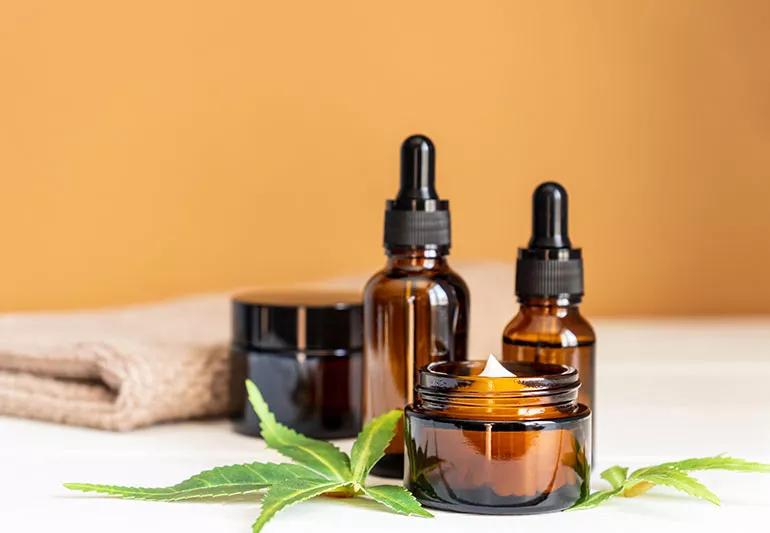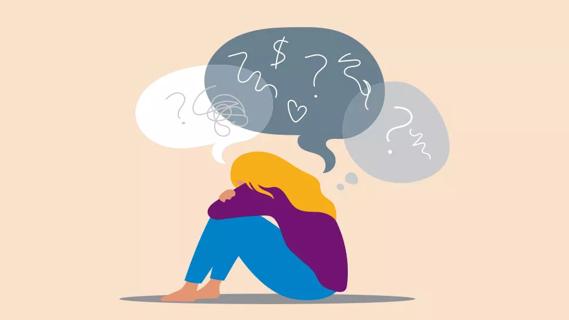Getting to the bottom of this popular trend

It’s likely that in the last few years, you’ve come across a lot of discussion and anecdotes about cannabidiol, also known as CBD. Availability and sales of CBD have exploded across the U.S. since it became legalized on the federal level and is now legal in most states.
Advertisement
Cleveland Clinic is a non-profit academic medical center. Advertising on our site helps support our mission. We do not endorse non-Cleveland Clinic products or services. Policy
You can find CBD on shelves in many stores, with various brands promoting benefits that range from alleviating pain to aiding sleep. It also comes in many forms like CBD gummies, CBD oils, CBD lotions and even CBD-infused sodas. And one big claim CBD supporters tout is its ability to relieve anxiety, a feeling many of us have experienced over the last few years thanks in part to the COVID-19 pandemic.
But not all CBD is created equally, and the truth about the benefits is kind of, well, complicated. To dig deeper into whether or not CBD actually curbs anxiety and what else you should know before trying it, we spoke to psychiatrist David Streem, MD.
“CBD is one of the chemicals present in cannabis-containing plants,” explains Dr. Streem. CBD mostly comes from hemp and, notably, contains very small traces of tetrahydrocannabinol (THC), the psychoactive ingredient that causes the “high” in marijuana. In fact, the U.S. government limits hemp-derived products from having a THC content of more than 0.3%.
As far as proven health benefits, there has been some evidence that CBD might serve as a treatment for chronic pain, but data is still mixed. More substantially, though, Dr. Streem says, “CBD has particular health benefits that have been demonstrated in scientific studies and it’s the active ingredient in an FDA-approved medication for the treatment of particular childhood seizure disorders.”
Advertisement
Specifically, he notes that CBD has shown benefits for children experiencing Lennox-Gastaut and Dravet syndromes, both rare conditions. “In these cases, the more common seizure medications don’t work very well.” CBD is part of a treatment package that includes other medications and even brain surgery.
In short, no. CBD probably doesn’t help curb anxiety the way advertisements or anecdotal evidence claim. “The science isn’t there yet,” says Dr. Streem, adding that while there are scientific studies backing the use of CBD for the previously mentioned seizure conditions, no such high-quality data exists for CBD and anxiety yet.
And if you’re waiting on those studies to turn out evidence, get comfortable. As Dr. Streem notes, studies that yield the necessary data are difficult for researchers to conduct for two reasons.
The first is government oversight and federal laws that make research into cannabinoids, including marijuana, difficult. While the number of states that have legalized some form of marijuana — whether for medical or recreational use — has dramatically increased in recent years, cannabis containing THC remains illegal on a federal level.
The U.S. Food and Drug Administration (FDA) also has its hands full trying to regulate it. Many states allow selling CBD over-the-counter as a dietary supplement even though that’s, technically, against FDA regulations. The FDA has warned dozens of companies about this practice but, so far, little has been done to change these practices. Dr. Streem says, “The FDA has to have evidence that there’s a safety risk before they can intervene.”
That overlaps with the second issue with CBD, which is a troubling lack of quality control. You can buy CBD just about anywhere now, from boutiques that specialize in CBD to your corner convenience store. But not all CBD is created equally, and neither is the labeling.
A 2017 study published in the Journal of the American Medical Association (JAMA) tested 84 CBD products from 31 different companies and found that 26% had less CBD than claimed on their respective labels, while 43% had more CBD than claimed on their labels.
Just as troubling, Dr. Streem points out that a number of the tested products had what he calls “relevant amounts of THC.” In other words, enough THC to trigger a positive on a drug test even if the label said there wasn’t any THC in their oil. And if you ingest CBD with a certain amount of THC, you’re also subject to the side effects, including delusions and hallucinations. Plus, there’s a chance these effects won’t go away when the effects of the drug wear off.
If you’re thinking of trying CBD without consulting with your healthcare provider, Dr. Streem has a simple response: Don’t. It’s about the unknowns, including the unregulated nature of most products and the possible inclusion of enough THC to flag a drug test.
Advertisement
“Trying a CBD product with consultation from your doctor is less risky,” advises Dr. Streem, “but you should still be aware of how the product makes you feel. If it makes you feel strange at all, stop using that product immediately.”
He continues, “If you could confirm that a product had no THC and had a CBD percentage close to what the label claims, there’s little concern it would do any harm regardless of the benefits. But that’s not what we’re dealing with right now.”
While data shows there are some benefits of using CBD in certain medically approved settings, for now, the scientific evidence just isn’t there for using CBD to help with anxiety, concludes Dr. Streem. Trying over-the-counter products without more stringent regulation carries more risk than reward.
Advertisement

Sign up for our Health Essentials emails for expert guidance on nutrition, fitness, sleep, skin care and more.
Learn more about our editorial process.
Advertisement

Going home isn’t always easy, but there are ways to ease any stress you might feel

Managing stress can help you sleep more soundly

This fast-acting anxiety medication should never be taken with alcohol, despite what you may see on The White Lotus

Deep breathing, positive mantras and tackling negative thoughts can help get you out of your head and cool down your anxiety

Focusing on what you can see, feel, touch and hear can help you feel more present in the moment

Performance anxiety and stage fright are outsized stress responses that can creep up when you’re put on the spot

A healthy amount of anxiety can keep you safe from harm and motivate you to take action

Although different conditions, they can occur together or cause one another

Even small moments of time outdoors can help reduce stress, boost mood and restore a sense of calm

A correct prescription helps your eyes see clearly — but as natural changes occur, you may need stronger or different eyeglasses

Both are medical emergencies, but they are very distinct events with different causes